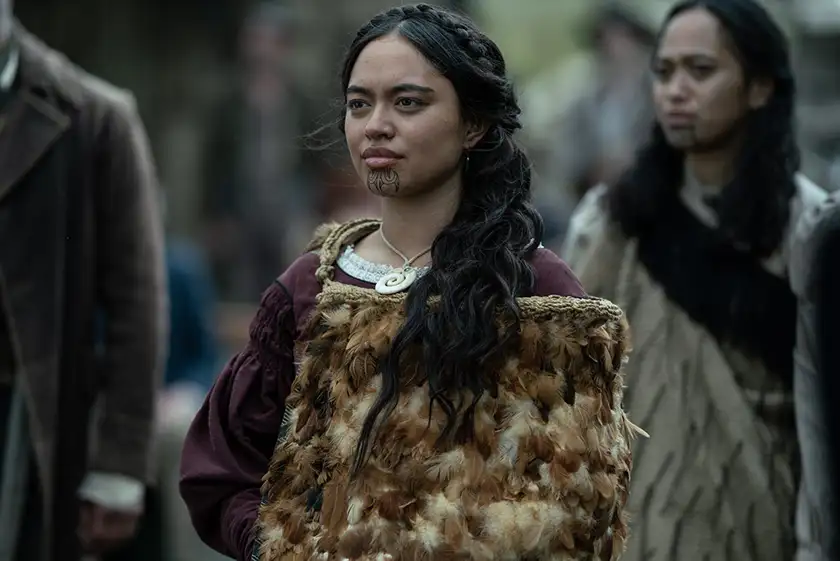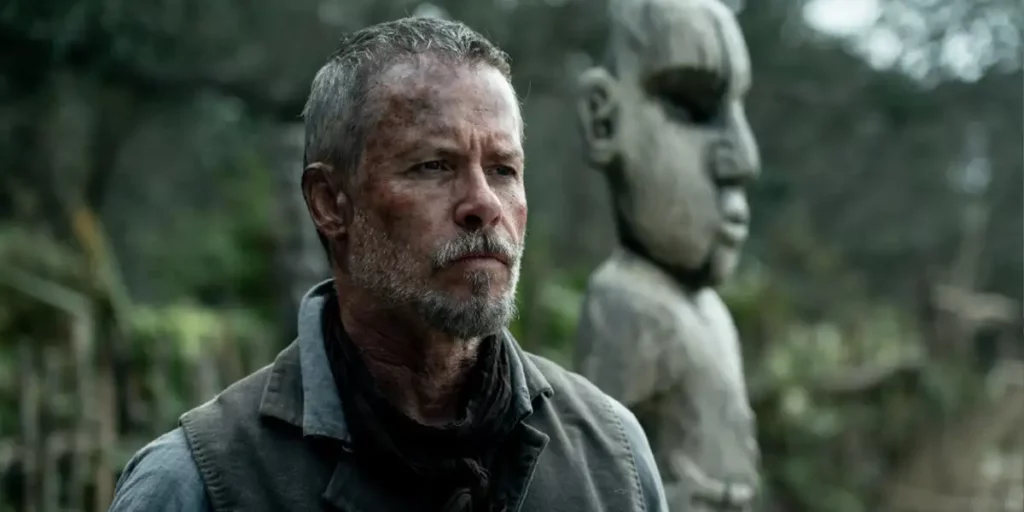Lee Tamahori’s The Convert is a stunning depiction of 1830s New Zealand and a ponderously violent look at the tension between natives and the looming threat of colonial rule.
Director: Lee Tamahori
Genre: Drama
Run Time: 119′
US Release: July 12, 2024
UK Release: TBA
Where to watch: in theaters & VOD
‘British preacher rocks up to a native tribe with the intention to teach the word of God’ is not exactly the summary of a good time, historically speaking. With The Convert, writer-director Lee Tamahori is looking more at the idea of converting one’s self, with the knowledge and understanding that, really, we’re all quite alike at the base of things.
It’s a visually stunning film that captures the beauty of New Zealand, the complexities of violence, and the question of whether peace and resolution is something we need to teach ourselves or have taught to us.
Thomas Munro (Guy Pearce, of Mare of Easttown), a soldier turned lay preacher brought over to a British settlement in 1830s New Zealand, finds himself unwittingly embroiled in the long-running feud between two warring Māori tribes – and the colonial settlers who stand to benefit when the “savages” kill each other – after saving the life of a Chief’s daughter, Rangimai (Tioreore Ngatai-Melbourne). As tensions grow, Munro must balance his faith and beliefs with Māori tradition, to find the peace and redemption he so desperately craves.
The film also feels self-aware in terms of its tendency to teeter on the brink of Munro’s white saviourism. After all he, quite literally, arrives on the island atop a white horse. But his, and most importantly Tamahori’s, respect for the Māori culture is so evidently present throughout the entire film that the trope never overwhelms the rest of the narrative. And there is a moment in the third act, when the film’s tension has reached its boiling point, that particularly highlights this.
As ‘villainous’ Akatarewa (Lawrence Makoare) and his warriors arrive, bloodthirsty and ready to storm the home of Chief Maianui (Antonio Te Maioha) and his people, they perform a haka – a traditional Māori celebration used to both honour and intimidate. It is one of the film’s most powerful moments, but is never framed as ‘strange’ or ‘other’, as perhaps it might have been in a more traditional colonialist-centric story. Instead, it is shown as an awe-inspiring, for Munro and for the audience, show of strength that indicates these are a people not prepared to buckle under the colonial hand that hovers over them. (History tells a much sadder and violent story, but for the purposes of The Convert, that’s the takeaway that’s most important here.)

Pearce, as the white not-quite-saviour Munro, is the figure around which the film needs to revolve around. His performance is delicately measured, devoid of self-aggrandising or moments of overt preaching, despite his status as a man of faith. There’s reference to a tragic and traumatic backstory, but the film is much more focused on the man he wants to be now, and the way in which his experiences shape his willingness to help others. It anchors the film, acts as a point of control around which the intensity of the supporting cast can bounce from, and emphasises just how good of an actor Guy Pearce is.
Munro’s connection with Ngatai-Melbourne’s Rangimai is perhaps the standout relationship of the film, her steely determination playing well off his calm resolution. The dynamic shifts a little after the introduction of Jacqueline McKenzie’s Charlotte, and the film itself takes on a slightly more melodramatic tone, but it doesn’t totally detract from what the film is trying to do.
And, ultimately, The Convert is looking to show that for Munro, the conversion he is seeking to experience is not to Christianity, per se, but rather to the understanding that the Māori people are just that: people. Just as inquisitive, violent, traditional and understanding as everyone else. He is looking to repent, yes, but also to find structure and faith in humanity again. He’s looking to understand that while his expectation may have been to teach others the word of God, he is ultimately seeking to teach himself of the humanity he values.
The Convert has an incredibly vivid sense of place, with its depiction of traditional Māori culture and the raw beauty of New Zealand, and it gives Munro a chance to achieve that. There are some shocking moments of violence, but a lot of the film takes place in the moments of tension between conflicts. It’s slow and contemplative at times, without the grit of Tamahori’s classic Once Were Warriors, but it still feels rich and lush. Pearce is a solid, calming presence in a film that leans more towards being ponderous than action-packed, but doesn’t sacrifice on its ambition to do so.
The Convert will be released in US theaters and on digital platforms on July 12, 2024.
Loud and Clear Reviews has an affiliate partnership with Apple, so we receive a share of the revenue from your purchase or streaming of the films when you click on the button on this page. This won’t affect how much you pay for them and helps us keep the site free for everyone.

